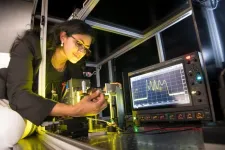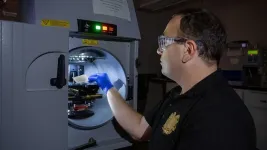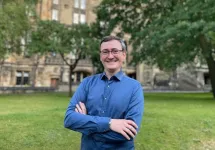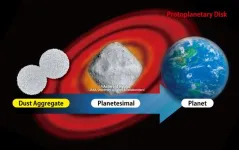(Press-News.org) Researchers from the University of Liverpool have created a biomedical compound that has the potential to stop the spread of breast cancer. A recently published paper details these early findings.
Scientists from the Chemistry and Biochemistry Departments at the University of Liverpool and Nanjing Medical School in China have discovered a possible way to block proteins produced in the body when a patient has cancer and which causes its spread to other parts of the body. This process, called metastasis, is largely responsible for patient deaths.
The major problem hindering the successful treatment of commonly occurring cancers is not the primary tumour which can usually be removed by surgery, but its spread to other organs of the body.
Prof Philip Rudland, Emeritus Professor in the University of Liverpool’s Department of Biochemistry, explained: “As a general rule, cancer that has spread is treated with chemotherapy, but this treatment can rarely be given without severely harming or becoming toxic to the patient. The importance of our work was to identify a specific and important target to attack, without toxic side effects.”
The University’s research team have in the past discovered that specific proteins are involved in the metastatic process; these proteins are different from those involved in the production of the primary tumour. One such example is a protein called ‘S100A4’, and is the protein chosen by the research team to target for the identification of chemical inhibitors of metastasis, using model systems of cells from the highly metastatic and incurable hormone receptor-free breast cancer.
Using these model systems, researchers at the University’s Department of Biochemistry discovered a novel compound that can specifically block the interaction of this metastasis-inducing protein S100A4 with its target inside the cell. Researchers in the Department of Chemistry then synthesised a simpler chemical and connected it to a warhead which stimulates the normal protein degrading machinery of a cell. This compound now works at very low doses to inhibit properties associated with metastasis, an improvement of over 20,000-fold on the original unarmed inhibitor, with virtually no toxic side effects. Moreover, in collaboration with Chinese researchers at Nanjing Medical School, they have shown that this compound inhibits metastasis in similar metastatic tumours in mice, suggesting a potential therapeutic role.
Dr Gemma Nixon, Senior Lecturer in Medicinal Chemistry at the University of Liverpool said: “This is an exciting breakthrough in our research. We now hope to take the next steps, and repeat this study in a large group of animals with similar metastatic cancers so that the efficacy and stability of the compounds can be thoroughly investigated and if necessary improved by further design and syntheses, prior to any clinical trials.”
“Significantly, this particular protein we’re investigating occurs in many different cancers, which could mean this approach may be valid for many other commonly occurring human cancers.”
The project was led by Dr Gemma Nixon and Prof Philip Rudland with Research Associate Dr Thamir Ismail, former PhD student Dr Rachel Crick, and biologists Dr Weiping Yu and Dr Zhenxing Cheng at Southeast University, Nanjing with Prof Guozheng Wang liaising between the two Universities.
Funding support for the project was provided by The Cancer and Polio Research Fund, Medical Research Council, Cancer Research UK, and Engineering and Physical Sciences Research Council.
The paper ‘Targeted Destruction of S100A4 Inhibits Metastasis of Triple Negative Breast Cancer Cells’ is published in Biomolecules (DOI: 10.3390 biom 13071099.)
END
University of Liverpool scientists make promising discovery in fight against breast cancer
2023-07-21
ELSE PRESS RELEASES FROM THIS DATE:
Male crickets court females in unison – unless rivals get too close
2023-07-21
Male crickets sing in unison to attract females – but stop singing if a rival gets too close, new research shows.
University of Exeter scientists watched more than 100 male field crickets, and measured how often they chirped at the same time (called “singing overlap”).
Singing by males one to five metres away from a listening male had a “stimulatory effect”, leading to a chorus of crickets singing together.
However, males were less likely to sing if another cricket chirped within one metre – possibly because the territorial insects instead chose to fight ...
Some people’s brain function still affected by Long COVID years after infection
2023-07-21
Some people’s brain function still affected by Long COVID years after infection
UK researchers have found that people with longer-term COVID-19 symptoms including brain fog showed reduced performance in tasks testing different mental processes up to two years after infection with the virus.
Researchers from King’s College London looked at whether infection with COVID-19 affected performance in two rounds of online cognitive testing that took place in 2021 and 2022. Data was collected for over 3,000 participants of the COVID Symptom Study Biobank study, across 12 tasks that tested memory, attention, reasoning, processing speed and ...
MASER technology scientist awarded funding for new research
2023-07-21
A scientist from Northumbria University has been awarded almost half a million pounds to develop a new technology which could transform deep-space communication, radio astronomy, medical imaging and airport security scanning.
Dr Juna Sathian has received a grant from the government’s Engineering & Physical Sciences Research Council (EPSRC) to develop a new type of MASER (Microwave Amplification by Stimulated Emission of Radiation) device.
The forerunner to LASERs, MASERs were first discovered in the 1950s. But there has been ...
Researchers decipher the secrets of Benjamin Franklin’s paper money
2023-07-21
Benjamin Franklin may be best known as the creator of bifocals and the lightning rod, but a group of University of Notre Dame researchers suggest he should also be known for his innovative ways of making (literal) money.
During his career, Franklin printed nearly 2,500,000 money notes for the American Colonies using what the researchers have identified as highly original techniques, as reported in a study published this week in the Proceedings of the National Academy of Sciences.
The research team, led by Khachatur Manukyan, an associate research professor ...
KIPA potentially predicts chemotherapy response in triple negative breast cancer
2023-07-21
Researchers at Baylor College of Medicine and collaborating institutions are developing a strategy to predict the response of triple negative breast cancer (TNBC) to chemotherapy, which would be a valuable tool for physicians deciding on the treatment with better probability of success on an individual basis. The study appears in Cancer Research Communications, a journal of the American Association for Cancer Research.
“Multiple research innovations in cancer diagnostics are on display in this work,” said co-corresponding author Dr. Matthew Ellis, member of the Lester and Sue Smith Breast Center and the Dan ...
On the hunt for strangeness
2023-07-21
NEWPORT NEWS, VA – Peter Hurck has been searching for strange particles, named such because they contain strange quarks, since beginning work on his Ph.D. As the 2023 Jefferson Science Associates (JSA) Postdoctoral Prize winner, he’ll continue conducting data analyses to identify strange particles and learn about their properties.
Many of these experiments that contribute to the data Hurck is analyzing are conducted at the U.S. Department of Energy's Thomas Jefferson National Accelerator Facility, which is managed and operated by JSA.
“Strangeness hasn't been studied as much because it's quite ...
ASBMB expresses concerns on proposed NIH budget cuts
2023-07-21
On July 19, the American Society for Biochemistry and Molecular Biology released a statement expressing concerns on the National Institutes of Health budget proposed in the House Labor, Health and Human Services, Education and Related Agencies funding bill. The bill allocates only $44.7 billion for NIH, which represents a 6.4% decrease from fiscal year 2023 levels and would have detrimental repercussions for the National Institute of Allergy and Infectious Diseases, the National Institute of Neurological Diseases and Stroke, the National Cancer Institute and the National Institute ...
To stick or to bounce: Size determines the stickiness of cosmic dust aggregates
2023-07-21
Microparticle dust aggregates, which are thought to play a role in the formation of new planets, are less likely to stick together after a collision when the aggregates are larger.
Current evidence suggests that microparticles of cosmic dust collide and stick together to form larger dust aggregates that may eventually combine and develop into planets. Numerical models that accurately characterize the conditions required for colliding microparticle aggregates to stick together, rather than bounce apart, are therefore ...
Long-term changes in waves and storm surges have not impacted global coastlines
2023-07-21
Changes in ocean wave and storm conditions have not caused long-term impacts on sandy coastlines in the past 30 years, a new study has found.
Published today in Scientific Reports, the study draws on data from 30 years of global satellite and model studies to investigate whether changes in ocean wave conditions will have an impact on the stability of coastal environments.
The compounding effect of climate change driven variations in waves, storm surge and sea level rise is projected to lead to shoreline position change along most of the world’s sandy coasts.
A team ...
Subseasonal transition of sea-ice anomalies in the Barents–Kara Sea in winter modulated by the “warm Arctic–cold Eurasia” pattern
2023-07-21
The “warm Arctic–cold Eurasia” is one of the most significant patterns of winter climate system changes in the mid-high latitudes of the Northern Hemisphere. In winter 2020/21, this large-scale pattern underwent a significant and intense subseasonal reversal between the early and late winter. At the same time, the sea-ice anomalies in the Barents–Kara Sea changed from being significantly negative in early winter to positive in late winter. For the slow-varying process of winter sea ice, the rapid freezing ...




